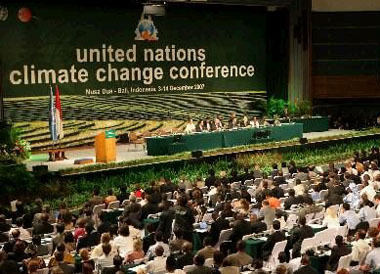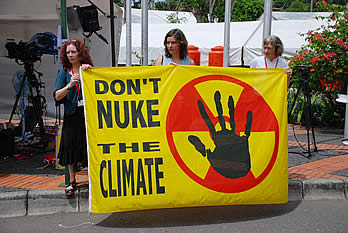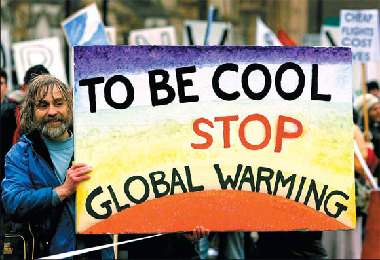As a two-week U.N. climate change conference is almost drawing to the end, the fate of Bali Roadmap, which is eyed on by the whole world, still hangs in the air.
The deadlock between the European Union and the United States, Japan and Canada over a number of goals for emissions in the final text of the meeting cast shadow over the fate of the meeting and raised the question over whether a Bali Roadmap, which is expected to guide global efforts in dealing with climate change impacts in the future can be achieved in the end.
The EU wants the Bali talks to agree a non-binding goal of cuts in emissions of 25 to 40 percent below 1990 levels by 2020 for industrial economies. Washington says such a range would prejudge the outcome of the negotiations.
The 4th assessment report of the U.N. Intergovernmental Panel on Climate Change (IPCC) makes it very clear that in order to avoid the worst damages of climate change, global emissions need to peak and decline before 2020.
In a speech delivered here on Thursday, Al gore, Nobel Peace Prize co-laureate and former U.S. vice president, accused his own country, the United States, of being "principally responsible" for blocking progress here toward an agreement on launching negotiations to replace the Kyoto Protocol when it expires in 2012. The protocol binds 36 industrialized countries to reduce emissions by an average 5 percent below the 1990 levels between 2008 and 2012.
He urged delegates from more than 180 countries not to lose the momentum by approving a Bali Roadmap during the meeting.
The deadlock between the EU and the U.S. came under spotlight Thursday as the EU threatens to boycott a U.S.-led climate talks in Hawaii in January.
"No result in Bali means no Major Economies Meeting," said Sigmar Gabriel, top EU environment official from Germany. "This is the clear position of the EU. I do not know what we should talk about if there is no target."
France Thursday also called on the United States to agree to figures on cutting carbon emissions, saying, otherwise, it would " hesitate" to take part in a U.S.-led climate meeting slated to be held in Hawaii, United States, in January.
The United States invited 16 other major economies, including European countries, Japan, China and India, to discuss a program of what are expected to be nationally determined, voluntary cutbacks in greenhouse gas emissions.
Adding insult to injury, as ministers from about 40 countries met just hours before the end of the Bali summit to finalize a declaration on ways to fight climate change, the U.S. government delegation submitted a new proposal one hour before midnight Thursday that wanted to get away from international commitments on mitigating emissions of greenhouse gases (GHG) that are blamed for climate change and came up with national domestic objectives instead.
The World Wide Fund for Nature (WWF) said the U.S. move has the potential to derail Bali climate conference and push the Bali climate negotiations to the "brink of failure".
WWF International Director General James P Leape said. "This proposal would gut the international effort towards halting climate change and put the future of our planet at risk."
Shane Rattenbury of Greenpeace international said: "This proposal would throw away 12 years of progress. It's a made-in-the- US plan for a climate catastrophe, undoing any commitments to cutting greenhouse gases."
A member of the Indian delegation said the proposal was not acceptable to India. The group of 77 countries had also come up with a counter-proposal and negotiations were on.
U.N. Secretary General Ban Ki-moon on Friday urged climate negotiators from over 180 countries meeting in Bali to discuss climate change to have "a political and historical responsibility" to reach a deal. It would be "very serious" if the meeting can not reach a deal, he said. "I think there will be an agreement."
Hans Verolme, Director of WWF's Global Climate Change Program said during the climate meeting: "Leaders must agree a formal Bali Mandate not a roadmap to nowhere, but a highway to stopping dangerous climate change."
The time is running out for the policy makers here as the climate meeting, which gathered over 10,000 delegates from over 180 countries, is scheduled to end on Friday.
Meanwhile, news reports said a compromise draft text to launch in Bali two years of negotiations for a global pact to fight climate change has dropped a key ambition of tough 2020 greenhouse emissions cuts for rich countries.
The fate of the Bali roadmap that is supposed to start a two- year process of negotiations on an international pact to fight global warming is still full of twists and turns.
(Xinhua News Agency December 14, 2007)








